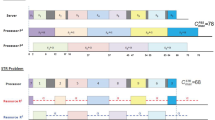Abstract
We consider the problem of schedulingn jobs nonpreemptively onm processors to minimize various weighted cost functions of job completion times. The time it takes processorj to process a job is distributed exponentially with rate parameterμ j , independent of the other processors. Associated with jobi is a weightw i . There are no precedence constraints and any job may be processed on any processor. Assume thatμ 1 ≥μ 2≥...≥µ m andw 1≥w 2≥...≥w n . Then for certain weighted cost functions, the optimal policy is such that the processors can be partitioned into setsS 1, ...,S n+1 such that if the fastest available processor is in setS i ,i=1, ...,n, then jobi should be assigned to it, and if it isS n+1, it will never be used. After each assignment the jobs are renumbered (so that jobi+1 becomes jobi if jobi is assigned to a processor). The partitioning is independent of the job weights and the states (busy or idle) of the processors. The optimal policy can be determined in at most max {m, n} steps. If all the weights are identical, the optimal policy reduces to a simple threshold rule such that a job should be assigned to the fastest available processor, sayj, if there are more thanK j jobs waiting.K j will depend onμ 1, ...,μ j but not onμ j+1, ...,µ m . The optimal policy is also individually optimal in the sense that it minimizes the cost for each jobi subject to the constraint that processors will first be offered to the jobs in the order 1, 2, ...,n.
We explicitly characterize the optimal policy for several specific examples of cost functions, such as weighted flow time, weighted discounted flowtime, and weighted number of tardy jobs.
Similar content being viewed by others
References
A.K. Agrawala, E.G. Coffman, Jr., M.R. Garey and S.K. Tripathi, A stochastic optimal algorithm minimizing exponential flow times on uniform processors, IEEE Trans. Comp. C-33, no. 4 (1984).
E.G. Coffman, Jr., L. Flatto, M.R. Garey and R.R. Weber, Minimizing expected makespans on uniform processor systems, Adv. Appl. Prob. 19 (1987) 177–201.
C.A. Courcoubetis and M.I. Reiman, Optimal dynamic allocation of heterogeneous servers under the condition of total overload: The discounted case, Working Paper (1988).
C. Derman, G.J. Lieberman and S.M. Ross, On the optimal assignment of servers and a repairman, J. Appl. Prob. 17 (1980) 577–581.
C. Derman, G. Lieberman and S. Ross, A sequential stochastic assignment problem, Mgmt. Sci. 18 (1972) 349–355.
K.D. Glazebrook, Scheduling tasks with exponential service times on parallel processors, J. Appl. Prob. 16 (1979) 685–689.
G.H. Hardy, J.E. Littlewood and G. Polya,Inequalities (Cambridge University Press, 1934).
T. Kampke, On the optimality of static priority policies in stochastic scheduling on parallel machines, J. Appl. Prob. 24 (1987) 430–448.
T. Kampke, Necessary optimality conditions for priority policies in stochastic weighted flowtime scheduling problems, Adv. Appl. Prob. 19 (1987) 749–750.
P. Kumar and J. Walrand, Individually optimal routing on parallel systems, J. Appl. Prob. 22 (1985) 989–995.
W. Lin and P.R. Kumar, Optimal control of a queueing system with two heterogeneous servers, IEEE Trans. Automatic Control AC-29 (1984) 696–703.
S.A. Lippman, Applying a new device in the optimization of exponential queueing systems, Oper. Res. 23 (1975) 687–710.
R. Nelson and D. Towsley, Approximating the mean time in system in a multiple-server queue that uses threshold scheduling, Oper. Res. 35 (1987) 419–427.
M. Pinedo and G. Weiss, Scheduling of stochastic tasks on two parallel processors, Naval Res. Logist. Quart. 26 (1979) 527–535.
R. Righter, The stochastic sequential assignment problem with random deadlines, Prob. Eng. Inf. Sci. 1 (1987) 189–202.
R. Righter, Job scheduling to minimize expected weighted flowtime on uniform processors, Syst. Control Lett. 10 (1988) 211–216.
R. Righter, Stochastically maximizing the number of successes in a sequential assignment problem, J. Appl. Prob. 27 (1990) 351–364.
R. Righter and S. Xu, Scheduling jobs on heterogeneous IFR processors, J. Appl. Prob. (1990), to appear.
S. Ross,Introduction to Stochastic Dynamic Programming (Academic Press, New York, 1983).
J. Walrand, A note on “Optimal control of a queueing system with two heterogeneous servers”, Syst. Control Lett. 4 (1984) 131–134.
R. Weber, P. Varaiya and J. Walrand, Scheduling jobs with stochastically ordered processing times on parallel machines to minimize expected flowtime, J. Appl. Prob. 23 (1986) 841–847.
R.R. Weber, Scheduling jobs with stochastic processing requirements on parallel machines to minimize makespan or flowtime, J. Appl. Prob. 19 (1982) 167–182.
G. Weiss and M. Pinedo, Scheduling tasks with exponential service times on non-identical processors to minimize various cost functions, J. Appl. Prob. 17 (1980) 187–202.
G. Weiss, Approximation results in parallel machines stochastic scheduling, Ind. Syst. Eng. Reports Series, no. J-88-3, Georgia Institute of Technology (1988).
S. Xu, Minimizing expected makespans of multi-priority classes of jobs on uniform processors, preprint (1989).
S. Xu, Scheduling stochastic jobs on uniform processors to minimize flowtime in distribution, preprint (1988).
Author information
Authors and Affiliations
Rights and permissions
About this article
Cite this article
Righter, R., XU, S. Scheduling jobs on heterogeneous processors. Ann Oper Res 29, 587–601 (1991). https://doi.org/10.1007/BF02283615
Issue Date:
DOI: https://doi.org/10.1007/BF02283615




